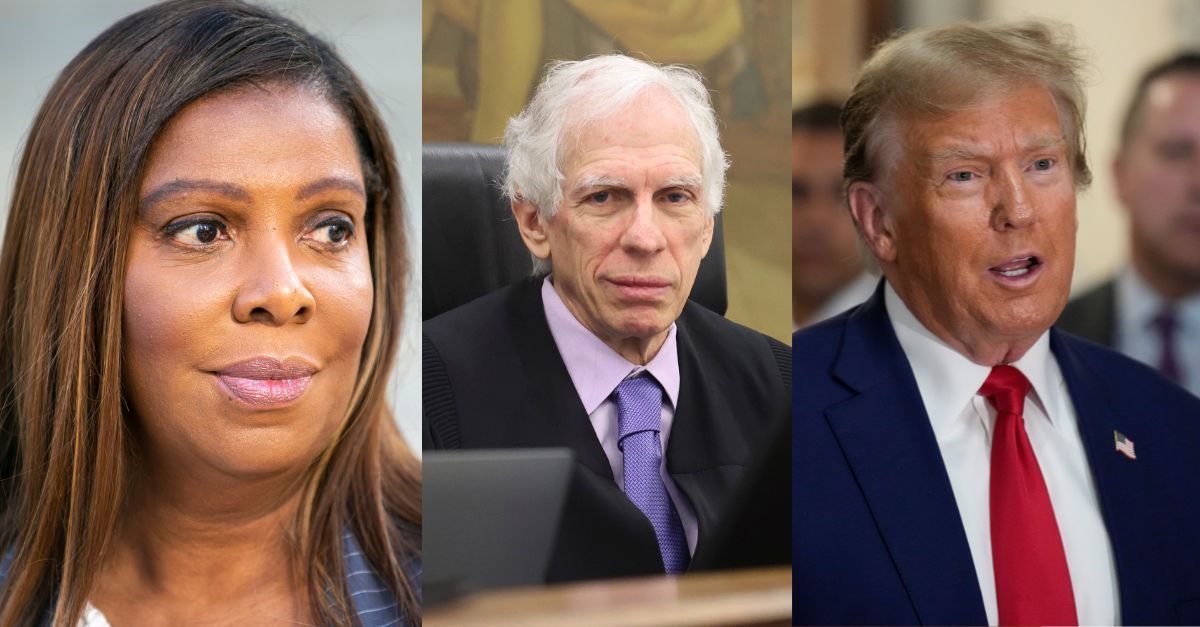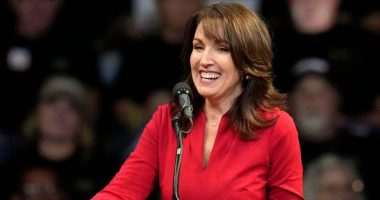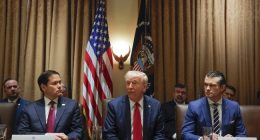
Left: New York Attorney General Letitia James speaks to the media, Nov. 6, 2023, in New York. (AP Photo/Ted Shaffrey, File); Center: Justice Engoron. (AP Photo/Seth Wenig, File); Right: Former President Donald Trump speaks during a break in closing arguments at New York Supreme Court, Thursday, Jan. 11, 2024, in New York. (AP Photo/Seth Wenig)
New York Attorney General Letitia James on Friday asked a judge to reject the $175 million bond posted by former President Donald Trump intended to secure an appeal of his massive civil fraud judgment.
The Empire State’s top law enforcement official claims the defendant has not been able to identify “sufficiently secure and ascertainable collateral backing the bond” as he attempts to prevent the state from collecting on the $454 million civil fraud judgment issued against him by New York Supreme Court Justice Arthur Engoron in February.
In the filing, James asks Engoron to deny a recent defense motion justifying the surety, declare the bond to be “without effect,” and issue an order “that any replacement bond be posted” within seven days.
Earlier this week, in an extensive series of court filings including a memorandum, affirmations in support, and exhibits, attorneys for the 45th president as well as those representing Knight Speciality Insurance Company (KSIC) responded to an early April filing by the attorney general’s office about the sufficiency of the bond.
To hear James tell it, the bond was issued “without a certificate of qualification pursuant to” an insurance law on point in New York.
The defendant and his underwriters say that a “rare” exception “should be set aside” because there is “overwhelming” evidence the “$175 million bond is fully collateralized by $175 million in cash” in a brokerage account, which KSIC “has the right to exercise control over.”
James, in her 26-page reply, says this misstates the facts.
“KSIC does not now have an exclusive right to control the account and will not obtain such control unless and until it exercises a right to do so on two days’ notice,” the government’s filing reads. “If the value of the funds held in the account dips below $175 million, the Trust promises to ‘true up’ the balance by depositing additional funds in multiple permitted forms, including stocks — a promise that is hollow if the Trust does not have the funds to do so and concedes the value of the collateral will fluctuate based on market conditions.”
More Law&Crime coverage: ‘The assets would be forever gone’: Trump and his attorneys rage over ‘completely illogical’ suggestions by NY AG’s office on how to satisfy $454 million civil fraud judgment
On top of that, the attorney general says Trump’s current underwriters should not be trusted here for several reasons.
According to James, KSIC is “a small insurer that is not authorized to write business in New York and thus not regulated by the state’s insurance department,” and has “never before written a surety bond in New York or in the prior two years in any other jurisdiction, and has a total policyholder surplus of just $138 million.”
Additionally, the attorney general’s office questions whether KSIC “has sufficient capacity to justify writing a $175 million bond” because “KSIC sends 100% of its retained insurance risk to affiliates in the Cayman Islands, where lax regulations allow KSIC to use this risk transfer to reduce the liabilities it carries on its books in a way that artificially bolsters its surplus — a practice New York regulators have dubbed ‘shadow insurance’ and about which they have sounded the alarm.”
Finally, James points to some past conduct that allegedly does not bode well for the company and/or the parties in the case.
“[U]nder the regulations that govern the placement of insurance on an excess lines basis, a licensed excess lines broker may place business with an unauthorized insurer like KSIC only if it is satisfied that the insurer’s management is trustworthy and competent,” the attorney general’s reply goes on. “KSIC is not qualified to act as the surety under this standard because its management has been found by federal authorities to have operated affiliated companies within KSIC’s holding company structure in violation of federal law on multiple occasions within the past several years.”
Trump and the other defendants are planning to appeal the judgment — on both a basic level and in terms of the amount owed.
In the long-running and far-reaching fraud case, several defendants — including numerous Trump-affiliated companies — were found liable on multiple counts on summary judgment in September 2023.
A bench trial — a trial without a jury — on the extent of liability was held between October and December 2023. In February, New York Supreme Court Justice Arthur Engoron arrived at a penalty just shy of the $370 million the state had asked for in January.
A hearing on the bond dispute is slated for Monday morning.
Matt Naham contributed to this report.
Have a tip we should know? [email protected]





